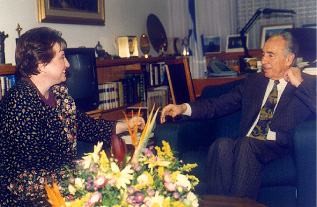We are very glad that Tsippi Fleischer’s complete works including a collection of CDs are a big part of our treasures of our archives.
Tsippi Fleischer will be our guest in our event „Komponistinnen-Welten“ (Worlds of Women Composers) October 10, 2016 – the day of our general annual meeting e. g. with Prof. Dr. Eva Weissweiler and Fleischer’s pianist Margarita Feinstein playing works written by jewish women composers. The highlight of the event will be an interview about life and work with Tsippi Fleischer and the introduction of her new video opera!

„Tsippi Fleischer was born in Haifa, Israel, in 1946. Her parents, Polish-born Jewish pioneers – Yaacov Fleischer from the city of Krakow and Shoshana, nee Mehl, from the Jewish shtetl Rimanov – met in Palestine. Before Tsippi was born her father’s entire family had already perished during the Holocaust.
As a three-year-old she was already improvising at the piano.
In time she studied piano and theory formally at the Rubin Conservatory of Music, Haifa, and matriculated from Haifa’s Reali School in the oriental stream.
Her academic degrees include: BMus in theory, composition and conducting – the Rubin Academy of Music, Jerusalem; BA in Hebrew Language, Arabic Language, Literature and History of the Middle East – Tel Aviv University; Music Teacher’s Diploma – the Levinsky College of Education, Tel Aviv; MA in Music Education – New York University; MA in Semitic Linguistics – Tel Aviv University; PhD in Musicology – Bar Ilan University, Israel. Her doctoral thesis focused on historical research into the origins of Cherubini’s Médée and on an in-depth analysis, using a combination of Heinrich Schenker’s and Jan LaRue’s analytical methods.
Fleischer’s style has diversified greatly during her creative life; her many achievements are characterized by the dynamics of change. The first beginnings in the 70s are typified by a search for a compositional style in which to incorporate her oriental studies. The 80s brought the formation and crystallization of this style, marked by a finely honed tonality and images of the Israeli landscape. At the end of the 80s her work reached new heights with settings to music of literary Arabic texts. The outstanding work of this period is the cantata Like Two Branches with a text by the 6th century Bedouin poetess Al-Khansa. A spurt of creativity in the 90s found expression in daring musical textures inspired by ancient, far-distant Semitic sources.
To summarize her musical style, at least three directions may be distinguished:
I. The combination of the exoticism innate in history and geography with the reality of present time and locality.
II. The experiences of the maternal-feminine sub-conscious, revealed in a dreamlike wave of inspiration, where realism and surrealism meet.
III. A rich kaleidoscope of colors inherent in the sonorities of language and of acoustics. Fleischer’s 30 years of composition reflect important currents in the dynamics of contemporary music for the stage in Israel and in the world at large. All her works have been recorded by international recording companies (Vienna Modern Masters, Opus One, Aulos Schwann Koch) and are broadcast on radio stations in Israel and abroad. These recordings illustrate the composer’s beauty of expression in a multiplicity of styles and with authentic individuality.“
